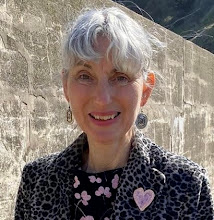In keeping with our theme our second session took place a week late as we cancelled January 18th due to snow!
So our second session on "Change" took place on January 25th 2013. We discussed the fascinating question of identity. Our two main poems for the day were "When I was one-and-twenty" by A E Houseman and "Return to Cardiff" by Dannie Abse.Here's a sample of the wonderful Dannie Abse poem:
Return to
Cardiff
Dannie Abse
'Hometown'; well,
most admit an affection for a city:
grey, tangled
streets I cycled on to school, my first cigarette
in the back lane,
and, fool, my first botched love affair.
First everything.
Faded torments; self-indulgent pity.
The last verse captures in words that sense of trying to experience the past in the present:
No sooner than I'd
arrived the other Cardiff had gone,
smoke in the
memory, these but tinned resemblances,
where the boy I was
not and the man I am not
met, hesitated,
left double footsteps, then walked on.
Also in response to one of the quotations about change Hilary created a short story:
Change in Inevitable—except from a vending machine.
Hilary Robinson
“What do you think you are
doing?” the smartly dressed young woman—couture tweed coat, buckled high heeled
shoes and massive and massively expensive bag, glared at the older woman
(jeans, denim jacket, boots, long hair). The latter withdrew her hand from the
station vending machine. “Look!” A bar of Kit Kat and a twenty pence coin
nestled in it, “You see people are in such a rush they don’t stop for their
change.”
“But you didn’t put any money
in. You can’t take that. It isn’t yours.”
“I’d gladly give it to whosever
it is.”
They looked up and down the
empty platform, “Well I don’t want any of it.” The young girl almost stamped
her well heeled foot.
“Please yourself but think of
all the times a machine has gobbled up your money and not given you change.”
“I try not to use such
machines. The chocolate is probably damp and out of date. Not that that bothers
you!”
“Well no the date stamp
doesn’t as you know. Your own common sense is better to go by. They just
encourage waste, which I should think you were against, all that landfill when
one can’t give it to the pigs anymore. Chocolate isn’t good for you I agree. We
don’t eat it often. Things have changed. Of course when I was a child there was
still rationing, so I guess we did go a bit crazy afterwards. When I was your
age I was often too poor to buy chocolate.”
“That’s because you went on
being a student for ever.”
“Don’t exaggerate. And we
were poor.”
“Yes but you had GRANTS
imagine that. Fees paid, Accommodation paid. No student loans for you. And you
were never really poor as people are today. Families starving. And even student
loans taxed.”
“Darling must we quarrel
now?”
The young girl gave her
mother a smile, “No of course not. But you were privileged not poor.”
“Both I think. There were times when I
couldn’t buy a train ticket home from University.”
“I know and you hid in the loo until the
ticket inspector had gone by. And jumped over a fence at the other end of the
journey so as to get out of the station without a ticket. Disgraceful!”
“I used to hitch-hike until it wasn’t safe.
I only once gave the wrong name and address when I was caught by the inspector
and didn’t have any money.”
“Whereas today one hands over ones credit card and pays with
interest!”
The train chugged in to
the station and stopped noisily. It was almost empty and they easily found
their carriage and seats. “Why are the seats always facing the opposite way
from what we book?” asked the daughter grumpily.
Because the train must have been doing the
journey the other way round. They’d be the right way if we were coming back.
They just can’t work it out.”
“Well I suppose we can sit the way we like
as those facing us are empty?”
“Yes let’s.” They stored their heavy cases
in the luggage section, and settled themselves in their chosen seats. “Next
stop Paddington! You were right to choose this train. It’s slower but that
change at Newport is killing.”
“It’s the end,” agreed her mother “we always
have to change platforms, and if the lift isn’t working it hauling cases up and
down stairs and the train will never wait. The number of times I’ve watched it
pull out just as I get to the platform.”
“And the announcements are always in Welsh
which nobody understands, especially the Welsh!”
“Well here we are.” The mother got out a
book. The daughter got out her knitting, “Did you ever knit much?”
“Only when I had to be in the house looking
after you and then only if I was watching television. It seems strange to me
how much you all knit today.”
“ALL OFF AT WORCESTER
FOREGATE STREET.” Mother and daughter looked at each other in horror.
“We’ve got to change?”
“Seems like it.”
The train shuddered to a halt.
“ALL OFF. THOSE FOR PADDINGTON PLEASE BOARD THE TRAIN WAITING ON PLATFORM 2.”
They found their luggage,
dragged it off and joined a small group of people who’d been ejected from the
next carriage. And the next…and the next…and the next. All were quite elderly,
all clutching cases and all had chosen that train because it was a through
train to London. Groaning, moaning, sighing, and almost crying, they struggled
up the stairs and over the bridge. There was no staff to help. It was a strange
journey across England with two more changes. Eventually, very late, the train
drew into Euston Station. There were no announcement but one which said it was
the end of the journey. Nobody knew about tubes or the underground taxis to
Paddington where some were being met by family and friends; some had hotels
booked around the corner from Paddington Station.
“Have some Kit-Kat.”
“Thanks Mum.”
They ate their chocolate
pensively while they surrendered to the inevitable expense and joined the taxi
queue.
“You know Mum,” she sighed as she looked at
her mother’s mountain of cases, “I hate to say this but in all ways, the less
baggage the easier it is to change.”
.








No comments:
Post a Comment